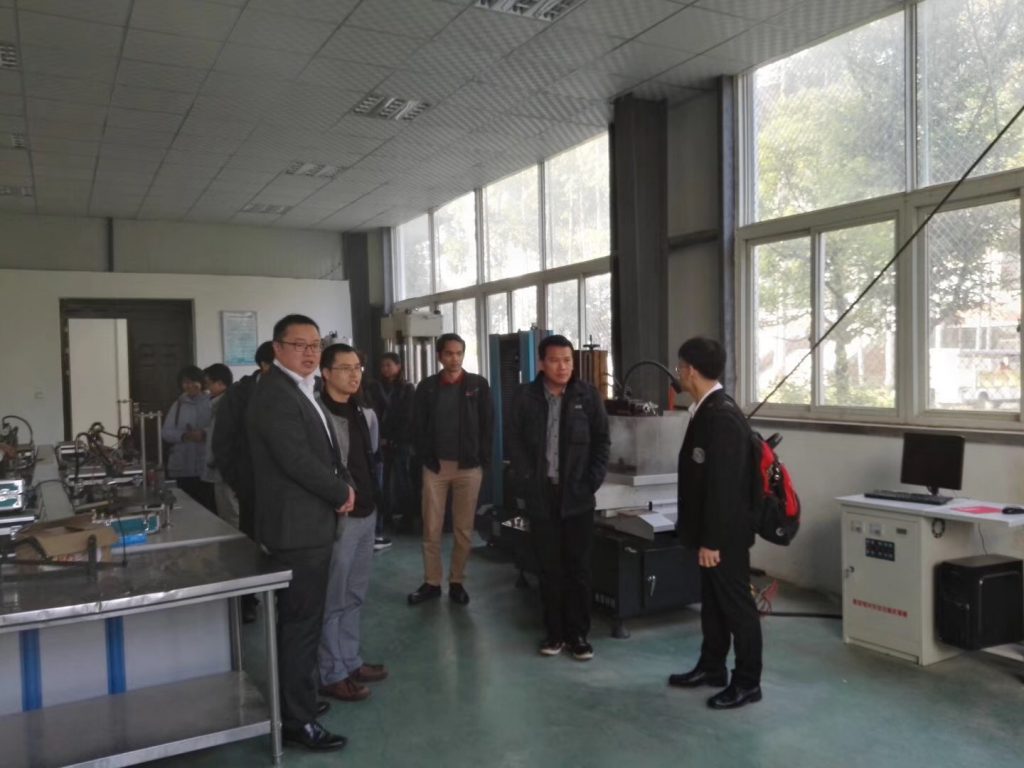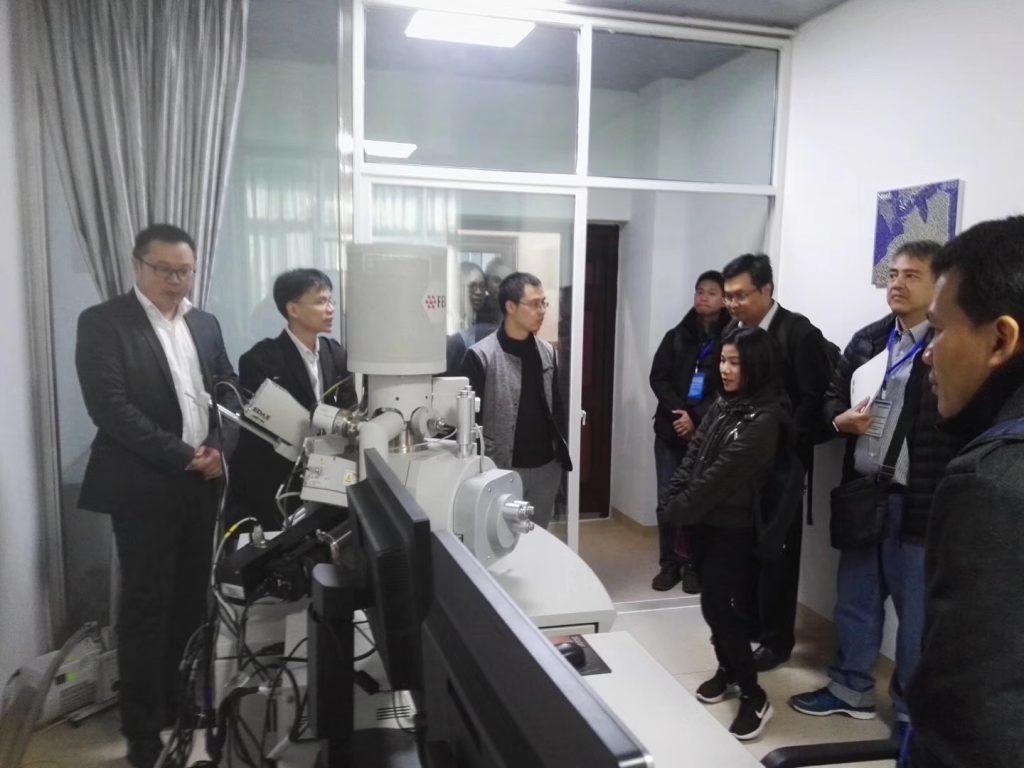Co-organized by the Beijing International Center for Theoretical and Applied Mechanics (BICTAM) and Chengdu University, the Second Sino-Thai Bilateral Workshop for Young Scholars in Theoretical and Applied Mechanics 2018 was successfully held at Chengdu University from Nov. 16 to 18, 2018. Over 40 participants from 15 universities and institutes attended this workshop.
The co-chairs of this workshop are Professor Xi-Qiao Feng, BICTAM secretary-general, Professor Nat Vorayos, dean of faculty of engineering, Chiang Mai University (CMU), Professor Qingyuan Wang, president of Chengdu University, Professor Weiqiu Chen, chair of International Exchanges and Cooperation Working Committee of CSTAM, and Professor Changqing Chen, CSTAM vice secretary-general. Professor Xi-Qiao Feng chaired the opening ceremony.

The opening ceremony of the Second Sino-Thai Bilateral Workshop was held at Longemont Hotel, Chengdu on the morning of Nov. 17. On behalf of the workshop organizers, Professor Qingyuan Wang, president of Chengdu University, delivered an opening speech to express warm welcome to all the attendees. Then, he briefly introduced Chengdu University and invited the attendees to visit the laboratories after the workshop, hoping that bilateral activities between China and Thailand could be held regularly to promote the academic exchange of their young scholars.
On behalf of the Thai side, Professor Phrut Sakulchangsatjatai, deputy dean of faculty of engineering, CMU, introduced the attendees from Thailand and stressed that holding regular workshops would play an important role in promoting S&T collaborations between the two nations. He encouraged all the attendees to conduct more exchanges and learn from each other. After that, Professor Xi-Qiao Feng from Tsinghua University, BICTAM secretary-general, introduced the general information of BICTAM and its international exchanges. He called for the two sides to take more active part in BICTAM’s activities. At the end of the opening ceremony, Professor Xi-Qiao Feng and Professor Phrut Sakulchangsatjatai presented souvenirs to each other as representatives of China and Thailand.


The workshop started with lectures after the attendees took a group photo. Xi-Qiao Feng, professor of Tsinghua University, Peerapong Jitsangiam, professor of CMU, Guozheng Kang, professor of Southwest Jiaotong University and Chaofeng Lv, professor of Zhejiang University were invited to give keynote lectures entitled “Dynamics of Collective Cells”, “Preliminary Investigation on Rock-Based Geopolymer as a New Sustainable Road Pavement Material”, “Rate-dependent Cyclic Super-elasticity Degeneration of NiTi Shape Memory Alloys” and “Theoretical Modelling on Monitoring the Growth and Rupture Assessment of Fusiform Aortic Aneurysm” respectively.
On the afternoon of Nov. 17, the workshop has organized 2 parallel sessions with a total of 20 lectures on the following topics. Those lectures they made are closely related and have distinctive features as well.
- Tuning Bandgaps in Soft Phononic Plates by Small Deformation, Prof. Weiqiu Chen, Zhejiang University
- Optimal Design for Grid-Tied Solar Power System with Battery-Ultracapacitor Hybrid Energy, Associate Prof. Warisa Wisittipanich, Chiang Mai University
- Scratch Behavior of 3D-Printed Polylactic Acid Texture Surface, Prof. Han Jiang, Southwest Jiaotong University
- H2 crossover simulation in MEA for PEM fuel cell, Associate Prof. Konlayutt, Punyawudho, Chiang Mai University
- Achieving ultralarge plasticity in magnesium alloys, Prof. Feng Zhao, Chengdu University
- Are Elastic Moduli of Biological Cells Depth Dependent or Not? Associate Prof. Guang-Kui Xu, Xi’an Jiaotong University
- Thermomechanical response of granular materials by infrared thermography, Dr. Pawarut Jongchansitto, Chiang Mai University
- Atomic scale study of the anti-vortex domain structure in polycrystalline ferroelectric, Associate Prof. Xiaobao Tian, Sichuan University
- Optical Fiber Sensor Technology for Mechatronic Engineering Applications, Associate Prof. Saroj Pullteap, Silpakorn University
- Investigations on Lamb Waves in Coupled-Resonator Elastic Waveguides, Dr. Yan-Feng Wang, Beijing Jiaotong University
- Deep Roll on TIG Welding Using Finite Element Analysis, Associate Prof. Wasawat NAKKIEW, Chiang Mai University
- Active Control on Elastic Wave Metamaterials with Nonlinear Properties, Prof. Yi-Ze Wang, Beijing Jiaotong University
- Computational-experimental framework for fatigue reliability assessment of turbine bladed disks, Prof. Shun-Peng Zhu, University of Electronic Science and Technology of China
- Microwave assisted hot air dryer for agricultural products, Associate Prof. Nattapol POOMSA-AD, Mahasarakham University
- A New Twist on Spider Dragline Silk, Associate Prof. Dabiao Liu, Huazhong University of Science and Technology
- Low-Carbon Alkaline-Activated Cement for Low Strength Applications, Dr. Teewara SUWAN, Chiang Mai University
- Nondestructive Evaluation of Contact Damage of Ferromagnetic Materials based on Metal Magnetic Memory Method, Dr. Kai Yao, Beijing Jiaotong University
- A Study of Hydrodynamics Behavior in a Swirling Fluidized Bed Combustor, Associate Prof. Kasama SIRISOMBOON, Silpakorn University
- Prediction thermo-elastohydrodynamic lubrication with considering surface roughness using CFD simulation, Dr. Sutthinan, SRIRATTAYA WONG, University of Phayao


On the morning of Nov. 18, 13 representatives from Thailand visited Chengdu University. They went to the Interdisciplinary Research Center for Material Science and Engineering of Chengdu University and the Center for Powder Metallurgy Engineering Technology of Sichuan Province, and discussed on fracture mechanics of piezoelectric materials, wind-resistant design of vehicles, and other research fields. The 2 days bilateral exchanges came to a successful ending.


The affiliations of attendees of this workshop include:
Chengdu University, Tsinghua University, Zhejiang University, Southwest Jiaotong University, Huazhong University of Science and Technology, Beijing Jiaotong University, Xi’an Jiaotong University, University of Electronic Science and Technology of China, Sichuan University, Chongqing University, Ningbo University, Chiang Mai University, Rajamangala University of Technology, Silpakorn University and Mahasarakham University.